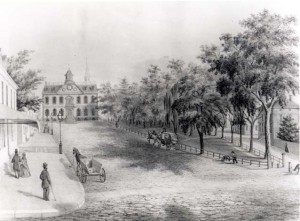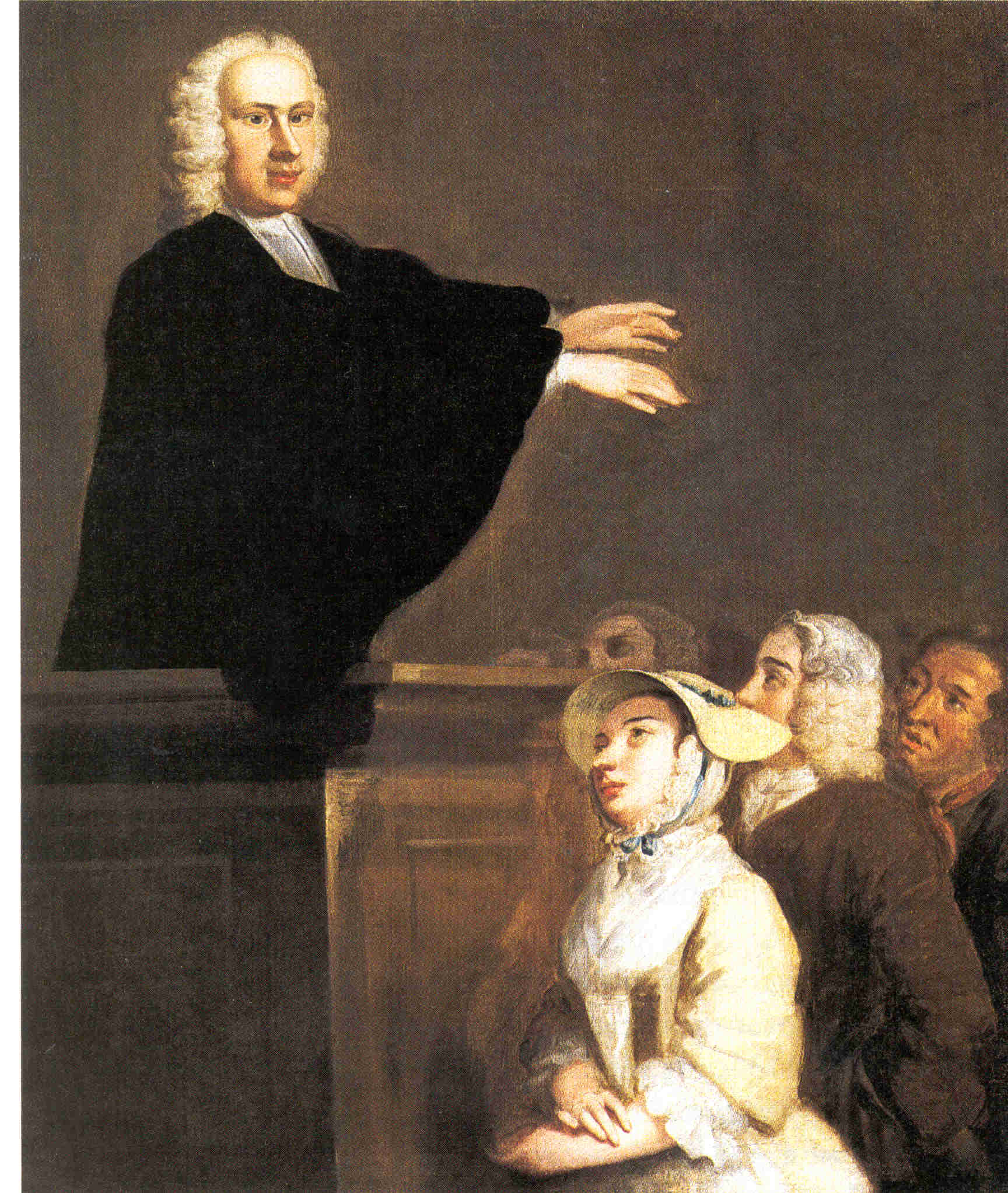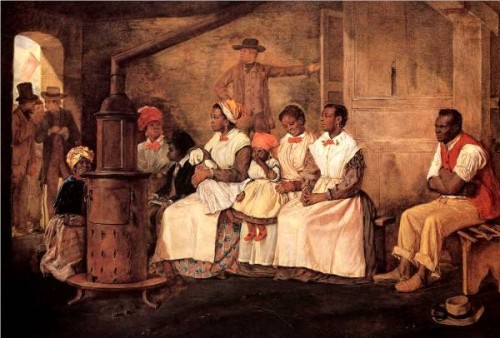Surely my soul remembers and is bowed down within me. This I recall to my mind, therefore I have hope. The Lord’s lovingkindnesses indeed never cease, for His compassions never fail. They are new every morning; great is Your faithfulness. The Lord is my portion, says my soul: therefor will I hope in him. (Lamentations 3:20-24)
Through all of the many afflictions in her life this verse remained one of Sarah Osborn’s favorites. Sarah maintained her faith in God through wars, poor health, the deaths of loved ones, and conflicts at her church. Today she has been all but forgotten, but Sarah Osborn deserves to be remembered for the part she played in the many lives of others in the eighteenth century. Hundreds of less fortunate people praised Sarah for her faith, courage, and humble service. Sarah believed that God used her suffering to draw her closer to Him and to be an example to others.
 Sarah Haggar Wheaten Osborn was born in England in 1714. Her family moved to Boston in 1723. Later they settled in the famous fishing town of Newport, Rhode Island where Sarah lived for the rest of her life. Sarah fell in love with a fisherman, Samuel Wheaten and married him in 1731 when she was only seventeen years old. Her parents did not approve of her marriage. Sadly, Samuel died at sea less than a year later leaving Sarah to care for their baby son alone.
Sarah Haggar Wheaten Osborn was born in England in 1714. Her family moved to Boston in 1723. Later they settled in the famous fishing town of Newport, Rhode Island where Sarah lived for the rest of her life. Sarah fell in love with a fisherman, Samuel Wheaten and married him in 1731 when she was only seventeen years old. Her parents did not approve of her marriage. Sadly, Samuel died at sea less than a year later leaving Sarah to care for their baby son alone.
Sarah had been raised as a Congregationalist but she claims that she did not have a true, heartfelt relationship with God until her personal conversion in 1737. After listening to Nathaniel Clap preach on the sinfulness of human beings, she repented of her worldly lifestyle and turned to Christ. For the rest of her life Sarah would seek to please the Lord out of gratitude for her salvation.
The Great Awakening was spreading through New England at this time. Jonathan  Edwards, George Whitefield, and Gilbert Tennent delivered hell-fire sermons that caused people to examine their lives and see how far they had strayed from living godly lives. Thousands of people including Sarah made commitments to become more involved in church. She dedicated her life to helping the poor, the sick, and slaves and free blacks.
Edwards, George Whitefield, and Gilbert Tennent delivered hell-fire sermons that caused people to examine their lives and see how far they had strayed from living godly lives. Thousands of people including Sarah made commitments to become more involved in church. She dedicated her life to helping the poor, the sick, and slaves and free blacks.
In 1742 when Sarah was twenty-eight years old she married Henry Osborn, a widower with three boys of his own. Now Sarah was the mother of four sons. Henry was fifty-seven years old and seemingly established in life. Sarah looked forward to being able to care for her family free of financial worries. But, within months Henry lost his fortune to poor investing and declared bankruptcy. It is not exactly clear why Henry was unable to work after this – poor health? – depression? – but Sarah became the breadwinner for the family. She felt a strong responsibility to stay out of debt.
Working as a teacher and a domestic servant for others Sarah was able to pay off the debts caused by Henry’s poor decisions and to feed the family. Later she opened a boarding school. The family was poor yet Sarah always managed somehow to share what little she had with others even less fortunate than herself.
Sarah wrote a memoir in 1743. She related how she had reached such a pinnacle of joy in her newfound salvation and marriage only to be plunged into the depths of despair when Henry lost their money. Writing the memoir helped her to come to grips with her feelings. By writing about God she felt closer to Him. She remained thankful to God for what blessings she had. She recalled with Jeremiah that God is her portion (Lamentations 3:24). She believed that knowing God is the most important thing. She hoped that her memoirs would inspire others to have hope when things went wrong. “Trust in the Lord and never despair of His mercy.”
Complete trust in God would be a challenge to Sarah in the years to come. In 1744 only one month before his twelfth birthday, Sarah’s only son Samuel died. Again Sarah turned to writing as she dealt with her sorrow. Sarah was tested as she wondered whether or not God had hidden His face from her. Through the pain of the loss Sarah came to accept God’s will for her. “I then arose from my dead child, and was quieted for the will of God was done, and my work was done as it respected my child.” Sarah later said that it was at this moment, incredible as it may sound, that God showed her His face. After she rose from her son’s deathbed she said, “God was pleased to give such evidence of his love that my mouth was filled with praises.” As she would through all of her trials Sarah saw God’s hand in her life. She believed that He loved her and only brought sadness in her life to bring her closer to Him.
Over the next few years all three of Sarah’s stepsons would die either of illness or being killed during the French and Indian War (1756 – 1763). The war caused even more scarcity of food and provisions but Sarah managed to earn enough to keep herself and Henry and his grandchildren alive. She continued to give away any extra money she had to neighbors. All of this she did while suffering from chronic illness probably rheumatoid arthritis. She complained very little about her own pain. As always she glorified God no matter what the circumstances.
Sarah wrote, “May Gratitude ever glow in my breasts to God and them and as I have freely received in times of my distress so let me freely give as God enables and occasion offers. Lord ever open my hand and heart to the sick, poor, and needy and make me a blessing in my day.” She took in her grandchildren and other orphans.
 Incredibly, even beyond this, while Sarah was busy working to care for her husband, her grandchildren and others she began to hold Bible studies in her home during the 1760’s. By January 1767, 525 people per week crowded into her home to pray, read the Bible, and be encouraged by Sarah. More than 70 slaves and free blacks would gather in her kitchen on Sunday nights and listen while she read the Bible to them. It was so crowded most of them stood shoulder to shoulder as Sarah told them the Good News that the Bible was written for each and every one of them not just white people.
Incredibly, even beyond this, while Sarah was busy working to care for her husband, her grandchildren and others she began to hold Bible studies in her home during the 1760’s. By January 1767, 525 people per week crowded into her home to pray, read the Bible, and be encouraged by Sarah. More than 70 slaves and free blacks would gather in her kitchen on Sunday nights and listen while she read the Bible to them. It was so crowded most of them stood shoulder to shoulder as Sarah told them the Good News that the Bible was written for each and every one of them not just white people.
Sarah herself had difficulty walking or even standing by now, but she said she never felt more alive in her life. She loved reading the Bible and singing hymns and praying. To make sure that more people could attend she arranged to have the meetings on different nights of the week. When the gathering included many adult men she asked Henry to pray in her stead.
A religious revival occurred at her house. It was controversial because Sarah was a woman. But what really hurt Sarah more was the ambivalence from church people because she had blacks coming to her home. Though evangelicals were paying lip service to emancipation and equality for slaves, the polite culture of Newport had difficulty with the idea that their slaves could be called “brothers and sisters in Christ”. Like so many they assumed that Africans were too ignorant or backward to understand the Gospel. Sarah believed that the Africans were equally children of God and should read and pray and worship God together with them.
By now Sarah was in her fifties. She was suffering with chronic pain. She was overloaded with work caring for others while maintaining a ministry in her home. But God still had nearly three more decades of service for Sarah.
Next week in Part 2 we will see how Sarah survived yet another war and church dissention. Sarah would become a spiritual leader of her church serving alongside the new pastor Samuel Hopkins. Together these two would begin the social reform in Newport beginning with the condemnation of slavery.

